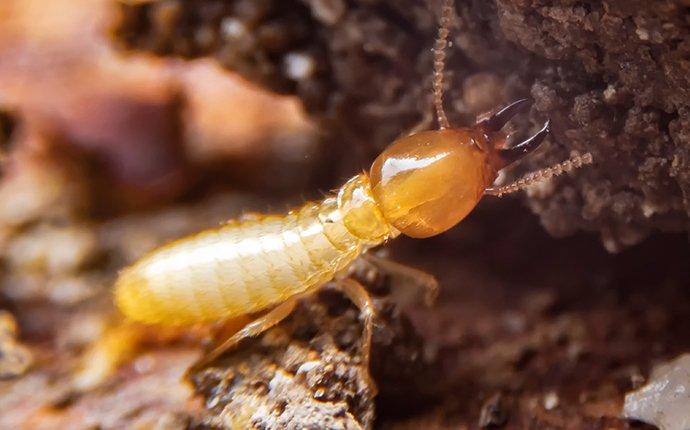Complete Ant Control: Approaches and Services to Defeat Ant Troubles
Complete Ant Control: Approaches and Services to Defeat Ant Troubles
Blog Article
Ecological Effect of Pest Control: Balancing Effectiveness With Sustainability
The environmental impact of bug control is a vital issue that calls for a delicate equilibrium between accomplishing effectiveness in managing pests and guaranteeing sustainability of our environments. From the use of hazardous chemicals that leak into our soil and water to the unintended effects on non-target species, the effects of traditional parasite control methods are far-reaching.
Dangerous Chemicals in Insect Control
The use of unsafe chemicals in pest control postures considerable ecological and health and wellness risks that call for mindful consideration and mitigation techniques. Herbicides, chemicals, and insecticides are commonly utilized to remove insects, however their prevalent application can cause unintended repercussions. These chemicals can contaminate dirt, water resources, and the air, impacting not only the targeted pests yet also valuable bugs, wild animals, and human beings.

To resolve these threats, integrated pest administration (IPM) strategies are being advertised as a much more sustainable alternative. IPM includes a mix of methods such as biological control, environment manipulation, and the targeted use chemicals as a last hope (ant control conover nc). By taking on an alternative approach to pest control, we can minimize the ecological and health influences associated with dangerous chemicals while effectively handling pest populations
Influence On Non-Target Types
Thinking about the unintended effects of bug control approaches, the effect on non-target types is a crucial element that needs extensive assessment. While insect control procedures aim to target specific parasites, other organisms in the community may be accidentally impacted. Non-target varieties, including advantageous bugs, birds, mammals, and even plants, can experience indirect or direct damage from chemical applications or biological control approaches.
Pesticides can have lethal or sub-lethal results on non-target varieties. Insecticides developed to combat a particular insect bug might harm pollinators like bees or all-natural killers such as ladybugs. Additionally, chemical residues can build up in the atmosphere, impacting non-target microorganisms over time. Biological control agents, if not species-specific, can posture dangers to unexpected targets, disrupting the eco-friendly equilibrium.
To reduce the effect on non-target varieties, integrated pest administration (IPM) methods that emphasize a holistic strategy to pest control are advised. These techniques focus on making use of ecologically friendly techniques, reducing injury to beneficial microorganisms while efficiently handling pest populaces. Conducting thorough risk analyses and keeping track of the outcomes of insect control efforts are necessary steps in protecting non-target species and promoting total ecological community health.
Dirt and Water Contamination
Unintentional ecological effects of pest control methods prolong past influencing non-target varieties, with significant implications for dirt and water contamination - termite control services. Chemicals, herbicides, and chemical plant foods used in pest control can seep into the dirt and contaminate groundwater, positioning a threat to both terrestrial and aquatic communities.
Water contamination is one more essential concern associated with pest control techniques. To alleviate soil and water contamination from bug control activities, integrated insect monitoring strategies that prioritize sustainability and minimize chemical inputs are vital.
Air Pollution From Pesticide Usage
Exposure to airborne pesticides during agricultural applications poses a significant problem for air pollution control procedures. When chemicals are splashed onto plants, they can volatilize right into the air and type unpredictable natural compounds (VOCs) and various other air-borne pollutants. These chemicals can contribute to the formation of ground-level ozone, a significant element of smoke that can have destructive effects on human health, plant efficiency, and total air top quality. Furthermore, chemical drift, where pesticides are lugged by the wind to unplanned areas, can bring about the contamination of nearby ecosystems and water bodies.

Strategies for Sustainable Insect Control
In the world of farming practices, implementing sustainable pest control methods is vital for keeping environmental equilibrium and securing crop returns. Sustainable bug control emphasizes using eco-friendly techniques to manage parasite populations effectively while reducing damage to non-target organisms and ecosystems. Integrated Bug Monitoring (IPM) is a commonly embraced technique that incorporates organic, cultural, physical, and chemical control techniques to attain long-term insect administration options.
One key method in sustainable bug control is promoting biodiversity within agroecosystems. By boosting natural enemies of bugs, such as killers and parasitoids, farmers can minimize the demand for synthetic chemicals. Crop turning and diversity are additionally efficient methods to interfere with pest life cycles and produce less favorable problems for parasites to thrive. Furthermore, making use of pest-resistant crop selections and utilizing methods like catch chopping can aid minimize insect stress without depending heavily on chemical treatments. Ultimately, by integrating these sustainable parasite control approaches, farmers can achieve an equilibrium between pest administration effectiveness and environmental stewardship.
Verdict
In conclusion, the ecological impact of insect control techniques have to be very carefully thought about to stabilize effectiveness with sustainability. Unsafe chemicals used in parasite control can result in dirt and water contamination, air pollution, and damage non-target types - ant control. It is important to carry out sustainable pest control techniques to minimize these adverse impacts on the setting and promote learn the facts here now a healthier community for future generations
By adopting an alternative approach to pest control, we can minimize the ecological and health and wellness effects associated with unsafe chemicals while effectively managing pest populations.

To reduce the air contamination caused by pesticide usage, it is necessary to adopt incorporated pest administration techniques that focus on the usage of non-chemical bug control methods, such as plant turning, natural predators, and immune crop ranges. Lasting insect control stresses the use of ecologically pleasant methods to handle parasite populations successfully while minimizing harm to non-target organisms and ecological communities. Integrated Insect Administration (IPM) is an extensively adopted method that incorporates organic, cultural, physical, and chemical control techniques to attain lasting pest administration options.
Report this page